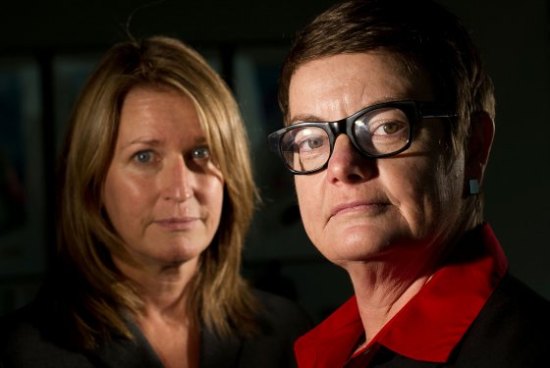 Sandra Stier and Kristin Perry
Sandra Stier and Kristin Perry
by Carlos Diaz
Yesterday the Supreme Court of the United States (SCOTUS) heard arguments on the case Hollingsworth v. Perry. Listening to the hour twenty minute long argument was a pleasant experience for me, but I am aware that most people will find a better use to those eighty minutes, that’s why I decided to make a wholesome summary of the oral arguments adding some analysis and background to put the case in perspective for those who don’t know a great deal about this specific case.
This case is about California’s Proposition 8, a ballot initiative to include a ban on same-sex marriage in the California Constitution. The ballot initiative was approved by a majority of California voters in 2008, effectively banning same sex-marriage in the nation’s most populous state. After the ban was enacted, Kristin Perry and Sandra Stier were denied a marriage license in California because they were a same-sex couple. They decided to sue the State of California in federal district court in San Francisco because they considered that their rights had been violated. The district court overturned Proposition 8, stating that the referendum was unconstitutional because it violated the Fourteenth Amendment’s Equal Protection and Due Process clauses. The case ended up in the Ninth Circuit Court of Appeals upheld the district court’s decision on Equal Protection grounds. Supporters of the proposition then asked the SCOTUS to review the case and the court granted certiorari.
The first ten minutes of yesterday’s oral arguments were spent discussing whether or not the defendants, led by Dennis Hollingsworth, had standing to argue this case in front of the Court. The reason so much time was spent on this question is simple. The State of California was supposed to be the defendant in this case since it was the one who denied the marriage license. The problem was that neither the Governor nor the Attorney General of California believed the law in question was constitutional so they refused to defend it. Mr. Hollingsworth, who was a main proponent of the law, then decided to take the role of the state. Justice Ruth Bader Ginsburg reminded Charles Cooper, counsel for the defendant, that the SCOTUS had never granted standing to proponents of ballot measures, to this Mr. Cooper replied that this was a special case.
Mr. Cooper expressed what he believed to be the essential question of this case: Whether the SCOTUS should put an end to the democratic process of each state deciding to allow same-sex marriage or not?
Cooper then went on to argue that the state’s principal interest in marriage is “regulating” procreation. Turning the institution of marriage into a genderless institution could harm the use society has “always” given marriage, argued Cooper. When questioned by Justice Elena Kagan, Cooper answered by saying that changing the legal definition of marriage will have real-world consequences and some of the consequences would be “adverse.” Cooper proceeded to say that this issue is too new to know what the consequences of it could be and that California should not act until it can assess what the consequences have been in Massachusetts –the first state to legalize same-sex marriage in the Union. These ambiguous responses by Cooper caused Justice Antonin Scalia to comment that there are concrete facts regarding this issue, such as the disagreement which exists among sociologists on whether raising a child with two parents of the same sex is harmful to the child. Justice Ginsburg then addressed Justice Scalia directly saying the raising of children by same-sex couples is already legal. Justice Scalia called her comment “irrelevant” because of the national scope of this case. Justice Stephen Breyer attacked Cooper’s argument about procreation head on by saying that in California people who are sterile, but not gay get married all the time. Cooper then said that allowing gays to marry would change the focus of marriage from procreation to the “emotional needs and desires of adult couples.” Justice Kagan showed how this already happens, for example when two people over the age of 55 get married. Cooper made a rather bizarre comment, saying that it was very rare that both parties to such a marriage would be sterile, this produced audible laughter in the court.
Almost ten minutes were also spent when it came time for the plaintiff’s counsel to present. Ted Olson was counsel for the plaintiffs, but he did not seem particularly interested in the issue of standing.
When Chief Justice John Roberts allowed him to move to the merits of the case he said that marriage is an individual right and therefore cannot be denied to consenting adults. Justice Scalia then asked Olson: When did it become unconstitutional to exclude homosexual couples from marriage? Olson replied with two questions of his own. “When did it become unconstitutional to prohibit interracial marriages? When did it become unconstitutional to assign children to separate schools?” Justice Scalia did not enjoy the questions, but answered “when the Equal Protection Clause was adopted.” Justice Samuel Alito asked Olson if the court should decide for all fifty states on this issue. Olson, with the help of Justice Sotomayor, explained that the court could decide only for California or for the whole country.
Then came the turn of United States Solicitor General, Donald Verrilli, who participated as amicus curiae–friend of the court. Mr. Verrilli’s main argument was that the court should impose same-sex marriages in states, like California, that have taken significant steps in the area of gay rights, but not in those states which have not done anything about gay rights. Some justices were not happy with this approach, Justice Alito asked Verrilli: “why should the court allow same-sex marriage in some states, but not in others?” Verilli answered, “because in states were gay couples can adopt children, but can’t marry the government is denying those children the “stabilizing” effect provided by marriage.”
When time for rebuttal arrived, something strange happened, Justice Anthony Kennedy asked Mr. Cooper: Why should the court decide this case now? Justice Scalia then jumped and said it was too late for that since the court had already granted certiorari.
Oral arguments can be misleading in forecasting how the SCOTUS will rule, but judging by everything surrounding this case it seems like the outcome will be positive for supporters of same-sex marriage.
Two outcomes seem most likely. First, the court will declare that the defendants have no standing, leaving the district court’s ruling in place. The other scenario is that the court will drop the case if they can’t find enough consensus to render a decision. What will most likely happen with any decision is that the court will limit this ruling to California only. This will be a victory for advocates of gay rights and will not cause widespread indignation in the public, something which could happen if the court extended its decision to all fifty states.
P.S: Today the court heard another case related to gay rights. I believe Defense of Marriage Act (DOMA) case will be much easier for the court to decide because of its homophobic roots.

 Sandra Stier and Kristin Perry
Sandra Stier and Kristin Perry James Steele meeting with Adnam Thabit (Head of Iraqi militias)
James Steele meeting with Adnam Thabit (Head of Iraqi militias)